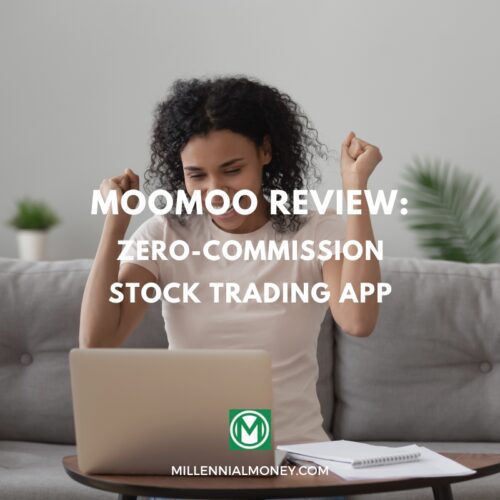Options trading isn’t particularly easy — which is why it’s crucial to have a user-friendly, data-rich platform to help you make transactions.
If you’re thinking about trying your hand at this risky investment strategy, you should definitely look into Webull, an online trading app used by millions of tech-savvy investors.
You can use Webull for trading stocks, options, ETFs, and cryptocurrencies — all without having to pay any commissions.
The company offers a few different account types. For example, you can open a retirement account and start a traditional IRA, a Roth IRA, or a rollover IRA. You can also open an individual taxable brokerage account and sell individual securities and assets.
As a trader on the Webull app, you receive access to in-depth analysis tools like advanced charts and technical indicators to understand trends and discover new opportunities.
Webull also comes with 24/7 support and provides full extended hours of trading that enable you to buy and sell stocks when the market is closed.
How to Trade Options on Webull
Ready to start? Here’s a step-by-step breakdown of how to start trading options on Webull:
1. Open a Webull Account
If you feel like you’re in a good place to start trading options, then it’s time to open up a Webull account. You need to be at least 18 years old and have a valid U.S. address, Social Security number, and government ID. The signup process takes just a few minutes.
Once you’re up and running, Webull randomly selects one full share of stock and gives it to you for free. How cool is that?
2. Fund Your Account
The next step is to link your bank account and add funds, which is necessary for making trades. In order to do this, you’ll have to provide your bank account and routing number. Be patient: The process generally takes a few days.
Once you link your bank account, Webull will transfer a second free stock into your account.
3. Request Approval
Brokers like Webull can’t legally allow options trading without vetting their users first. This is due primarily to the heightened risk that comes with trading options.
Some people complain about this, but I think it’s a good thing. Even if you think you’re in a good position to trade options, the powers that be may think otherwise — for your protection.
As such, you’ll need to fill out an options application to see if you qualify. During this process, the company will ask you questions about your financial situation and investing experience.
If Webull accepts your application, it will assign you a trading level based on your overall risk assessment. This determines the amount of options trading you can do on the platform.
According to Webull, there’s no way to upgrade your trading level. However, if you believe that your placement doesn’t accurately reflect your risk tolerance and trading experience, you can reapply and go through the approval process a second time. If you go this route, the company will give you a decision within one business day.
4. Start Trading Options
If Webull approves your application, you can start browsing for options to trade.
Head to the stocks details page and select the options button. At this point, you can select the options that you want to purchase.
Webull Options Strategies to Consider
Having an options trading strategy is important — and Webull supports a few different types. Here are some of the main strategies that you can use with Webull:
- Covered Stock: A covered stock strategy involves writing a put or call that has the coverage of an equivalent long or short stock position.
- Single-Leg: A single-leg option is a very basic strategy that requires buying a single option (i.e., a long put or long call) or selling it (i.e., a short put or short call).
- Vertical: A vertical strategy entails buying and selling multiple options of the same security, type, and expiration date but with different strike prices.
- Butterfly: A butterfly strategy combines three calls or puts, with a ratio of 1-2-1. Butterfly strategies have a capped profit and fixed risk — making them desirable to some new options traders.
- Condor: A condor is a non-directional options strategy. For example, you can have a long condor, which profits when stock prices appear to remain stable, or a short condor, which profits when the stock prices go up or down significantly.
- Collar: A collar strategy is for protection against large losses. The tradeoff is that it also inhibits large gains. You generally use a collar strategy when you anticipate the price of the underlying security will increase or decrease in the long run.
- Straddle: The straddle strategy requires buying a put option and call option, or selling a put and call for the underlying security with the same expiration date and stock price. You can execute a long or short straddle.
- Iron Butterfly: The iron butterfly merges two puts and two calls with three strike prices and single expiration date.
- Iron Condor: The iron condor strategy has two puts, two calls, four strike prices, and single expiration date.
Is Webull a Good App for Trading Options?
Overall, yes, Webull is a solid app for trading options. And its commission-free structure is right in line with most competitors. The main issue that you might encounter is the strict approval process. Again, this is right in line with industry standards. And if the company doesn’t approve you for trading options, you can always apply again.
However, if Webull rejects your application, think about why instead of rushing ahead to reapply or signing up for another platform. The vetting system is there for a reason. Also, if you don’t qualify for options trades, you can still purchase stocks, ETFs, and fractional shares on the platform.
Alternative Platforms for Trading Options
If you qualify for options trading on Webull, chances are you’ll qualify for options trading on other apps as well. Here are a few additional companies to consider:
Robinhood
Robinhood is an app that’s ideal for beginner investors, with a simple interface and limited research tools. The platform doesn’t charge a fee to buy or sell options.
Fidelity
Fidelity is a popular broker that supports options trading. The company has five trading levels and charges $0.65 per contract fee. Fidelity offers powerful analytics tools, making it a popular option for intermediate and advanced investors.
Charles Schwab
Schwab offers a powerful trading platform with real-time updates, making it ideal for advanced investors. Just like Fidelity, Schwab charges $0.65 per contract. The company doesn’t charge online commissions.
What is Options Trading?
Here’s a brief primer: An option is a conditional derivative contract between a buyer and seller. When you buy a contract, it gives you the ability to buy or sell an asset at a certain price at a specific point in time in the future.
It’s possible to trade options on stocks, bonds, currencies, and commodities.
Is Options Trading a Good Idea?
People often ask for my opinion about trading stock options. The truth of the matter is that I have mixed feelings about it.
One of the big upsides to trading options is that they can be very cost-efficient and give you massive leveraging power. If you make the right bet, you will potentially be able to buy a stock at a reduced price or sell it at an advanced price, enabling you to generate strong returns.
As a disclaimer, trading options is also very risky. If you make the wrong bet, you can potentially lose your entire investment — and a whole lot more.
Young investors often make the mistake of putting their money into options instead of stable securities that they like and believe will generate strong long-term revenue and recurring dividend payments.
Even though options trading is very popular right now, most financial experts tend to agree that these trades are more trouble than they are worth — especially for beginners with limited data, experience, and insights.
That said, trading options is ultimately your call. With the right approach, you might even do very well. Just know that this is a high-risk, high-reward endeavor.
Frequently Asked Questions
Can you get rich from options trading?
Absolutely. If you trade options correctly, you can potentially make a heck of a lot more money than you can from trading stocks. At the same time, you can lose a lot of money — perhaps even more money than you could possibly pay back. The market is volatile and difficult to predict, and if you make the wrong call, you can dig yourself into a hole of financial misery.
Is Webull a mobile app?
Yes. Webull offers a robust mobile app for Android and iPhone users. In addition, Webull desktop is available over any internet browser.
What is the Webull watchlist?
The Webull watchlist is the main dashboard that you see when you first log into the app or website. You can use the Webull watchlist to monitor companies and access data visualization tools.
Is Webull registered with the Securities and Exchange Commission (SEC)?
Yes, Webull is registered with the SEC as a broker-dealer. Additionally, Webull is a member of the Financial Industry Regulatory Authority (FINRA).
Does Webull offer paper trading?
Yes, Webull offers an easy-to-use paper trading platform that lets you simulate trades before using real money. This is an excellent way to practice trading without putting money on the line.
Should You Trade Options with Webull?
In the fintech-driven age, you no longer have to be a Wall Street investor to trade options contracts. Thanks to services like the Webull platform, more and more investors are becoming options traders — and making a fortune because of it.
Just keep in mind that everyone would be rich if it was easy to invest in the stock market. So if you want to trade options with Webull, it’s important to make sure you are in a position to take on extra risk.
Personally, trading options isn’t my thing. But if it makes sense for you and you’re willing to gamble, it could be worth checking out. You never know when you might strike it rich as an options trader.
If you decide to move ahead, I recommend starting small. Build a portfolio you’re proud of, and then maybe consider taking a minor options position to see how it works out.
Whatever you decide, I hope the cards fall in your favor and bring you closer to your long-term goal of financial freedom.





No comments yet. Add your own